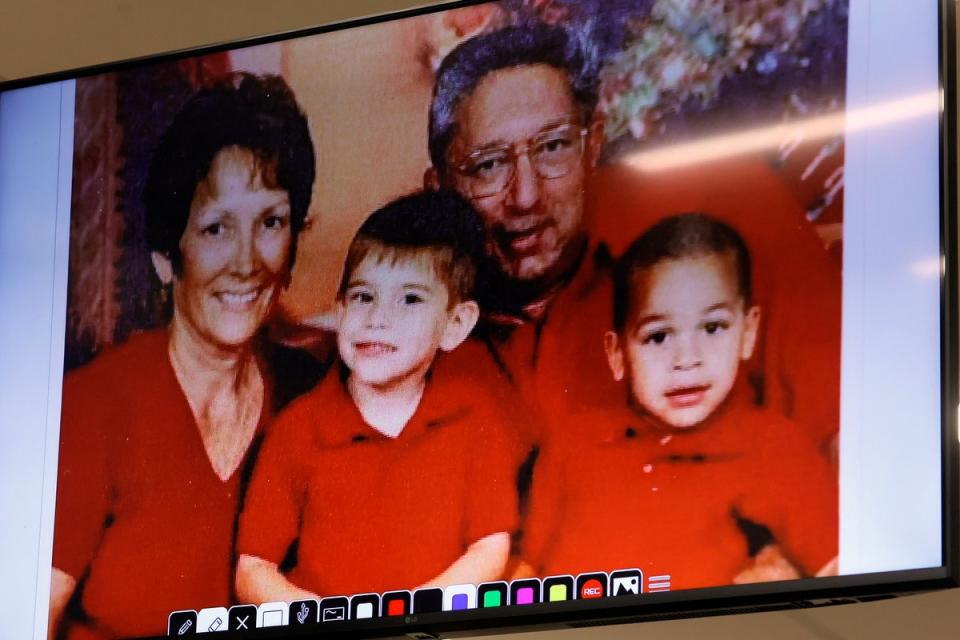Nikolas Cruz: What are fetal alcohol spectrum disorders and does the Parkland shooter have one?
Defence attorneys for mass murderer Nikolas Cruz began their case on Monday, as they seek to convince the jury that he should be sentenced to life in prison instead of death.
Cruz was 19 when he travelled to Marjory Stoneman Douglas High School on Valentine’s Day 2018 armed with an AR-15 style rifle.
He opened fire on students and staff inside the freshman building, killing 14 students and three staff members.
In October 2021, Cruz, now 23, pleaded guilty to 17 counts of murder and 17 counts of attempted murder.
A jury will now decide whether he should receive the death penalty or life without the possibility of parole.
At the centre of the defence’s case asking jurors to spare his life is their argument that birth defects, anti-social behaviour disorders and a troubled upbringing all contributed to him carrying out what remains one of the worst mass shootings in US history.
On Monday, the defence argued that he suffers from fetal alcohol spectrum disorders (FASD) caused by his biological mother abusing alcohol and drugs while pregnant.
What is FASD?
FASDs are conditions caused by an individual being exposed to alcohol in the womb before birth.
According to the CDC, alcohol is passed from the mother’s blood to the baby via the umbilical cord.
It is surprisingly common, occurring in up to 1 in every 20 people, according to FASD United.
The effects of FASD can vary but typically include both physical problems and behavioural and learning problems.
Signs and symptoms include: learning disabilities, small head size, hyperactive behaviour, poor reasoning and judgment skills, difficulty in school and intellectual disability, among other things.

There are several different conditions, which have different severities.
For example, individuals with Fetal Alcohol Syndrome (FAS) suffer from central nervous system (CNS) problems, minor facial features, and growth problems and are known to have trouble getting along with others.
Does Nikolas Cruz have FASD?
During the defence’s opening statement on Monday, lead public defender Melisa McNeill said that Cruz suffers from FASD caused by his biological mother Brenda Woodard abusing alcohol and drugs during pregnancy.
Ms McNeill said that the “choices” Cruz made on Valentine’s Day 2018 all began with the “choices” made by his biological mother when she “poisoned him in the womb”.
While Woodard was pregnant with Cruz, she was an alcoholic and a drug addict who was homeless and working as a prosititue.
“His brain is broken. He is a damaged human being,” she said.
“His prenatal vitamins consisted of... Bum wine, crack cocaine and cigarettes... Because of that his brain is irretrievably broken.”
Cruz’s biological sister Danielle Woodard and Ms Woodard’s former friend Carolyn Deakins both testified that they saw Woodard continue to drink, take drugs and smoke during her pregnancy.
It was also “well-documented” in official records about his mother, said the attorney.

Ms McNeill said that the impact of this became clear from an early age and Cruz began receiving special education services from the age of three and was given psychiatric help.
“He was seeing a psychiatrist. He was seeing a clinical psychologist. He had a case manager. In-home services. However he continued to struggle with behavioural issues and academic issues,” said Ms McNeill.
When he went to a mainstream high school, he struggled “behaviourally, socially and academically”, she said.
Educators and neighbours who knew Cruz from a young age testified about that they saw he had developmental and behavioural challenges from a young age.
Anne Fischer, who was the director of pre-school Young Minds Learning Center when one-year-old Cruz attended, testified that he showed slow developmental progress, communication difficulties and bit other children.
Special education teacher Susan Hendler Luber, who taught Cruz when he was around four to five, said that he was evaluated as having a social emotional developmental delay and a language impairment.
He pushed and scratched children, “pounced” on them if they got too close and displayed “animal fantasy behaviours,” she said.
Trish Devaney Westerlind, a family friend of Cruz’s late adoptive mother Lynda who used to be a neighbour of the family, said she noticed that her daughter surpassed Cruz developmentally with her social and motor skills despite him being older.
She said that Lynda initially didn’t want to hear that her son could need additional support but eventually took him to see a specialist.
The defence is expected to call medical experts to support its diagnosis claims.

When Cruz’s sentencing trial began back in July, FASD United released a statement saying that he “does not represent the FASD community”.
“Nikolas Cruz admitted killing 17 people at Marjory Stoneman Douglas High School in Parkland, Florida, in February 2018, and reports indicate that his sentencing trial could reference a diagnosis of a condition on the FASD spectrum—the range of developmental disabilities and birth defects that can occur in an individual prenatally exposed to alcohol. With no involvement in Cruz’s trial, FASD United cannot comment specifically on his diagnosis or his case,” the organisation said.
“Each individual with an FASD is unique and Nikolas Cruz does not represent the FASD community, which is filled with many successful, inspirational people who have a positive impact on our society, especially when they are supported and understood.”
The organisation said that people with FASD are “more vulnerable to negative environmental influences, which can lead to failed social outcomes”.
However, with care and support “these individuals can and do lead productive lives”.

